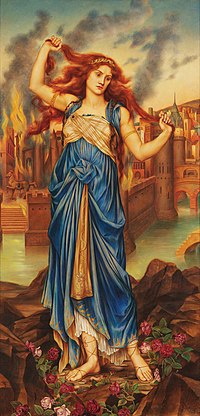Cassandra phenomenon: Difference between revisions
m moved Cassandra syndrome to Cassandra phenomenon: name was incorrect |
removing references to fictional syndrome that does not exist outside of movie |
||
| Line 15: | Line 15: | ||
The name is derived from the Greek myth of [[Cassandra]]. Cassandra was a daughter of Priam, the King of Troy. Struck by her beauty, Apollo provided her with the gift of prophecy, but when Cassandra refused Apollo's romantic advances, he placed a curse ensuring that none would believe her warnings. Cassandra was left with the knowledge of future events, but could neither alter these events nor convince others of the validity of her predictions. Cassandra correctly predicted that Paris's journey to kidnap Helen would end in doom for Troy. In Vergil's Aeneid, Cassandra warns specifically that the Greek gift of a giant wooden horse was soon to carry tragedy within the walls of Troy, a prophesy in which "All heard, and none believed". The term may also be applied in a sarcastic manner, referring to those who opportunistically claim to have predicted doom but were allegedly not believed. |
The name is derived from the Greek myth of [[Cassandra]]. Cassandra was a daughter of Priam, the King of Troy. Struck by her beauty, Apollo provided her with the gift of prophecy, but when Cassandra refused Apollo's romantic advances, he placed a curse ensuring that none would believe her warnings. Cassandra was left with the knowledge of future events, but could neither alter these events nor convince others of the validity of her predictions. Cassandra correctly predicted that Paris's journey to kidnap Helen would end in doom for Troy. In Vergil's Aeneid, Cassandra warns specifically that the Greek gift of a giant wooden horse was soon to carry tragedy within the walls of Troy, a prophesy in which "All heard, and none believed". The term may also be applied in a sarcastic manner, referring to those who opportunistically claim to have predicted doom but were allegedly not believed. |
||
The '''Cassandra Syndrome''' is also a term applied to those whose predictions of doom are initially dismissed, but later turn out to be correct. This denotes a [[psychological]] tendency among people to deny and disbelieve such predictions. The person making the prediction is caught in the dilemma of knowing what will happen but not being able to convince others. {{cn| March 2007}} |
|||
The figure of Cassandra has also been invoked to describe those who take the role of antagonist toward widespread or institutional ignorance of the future consequences of current actions. (Barbara Tuchman: March of Folly; From Troy to Vietnam). |
|||
The [[film]]s ''[[Twelve Monkeys]]'', ''[[The Dead Zone]]'', and ''[[Terminator 2: Judgment Day|Terminator 2]]'' all provide examples of this phenomenon. An 1961 episode of the television show ''[[Twilight Zone]]'' titled "Back There" relates the story of a modern man sent into the past who tries unsuccessfully to convince all who will listen of the impending assassination of Abraham Lincoln. |
|||
==References== |
==References== |
||
Revision as of 20:17, 21 March 2007
This article's factual accuracy is disputed. |

The Cassandra phenomenon is a term sometimes applied in relation to partners and significant others of an individual with Asperger Syndrome when they try to seek help and support, and relates to the disbelief they may encounter, even from professionals, when they seek help or support with the problems this invisible disability can create within a relationship or family. It can also refer to their own loss of faith in themselves within such a relationship[1].
The term has been defined (sometimes called the Cassandra Phenomenon) by Dr Tony Attwood[2]:
One of the issues has been what we call now the Cassandra phenomenon. The partner recognises that their husband or wife with Asperger's syndrome is different and nobody believes them. Cassandra in Greek mythology had the gift of prophecy but the curse that nobody would believe her, so quite often as a partner you may be describing these things but when you go to professionals your partner may know intellectually what is the right answer to give, acts or makes a façade, and other people may think that you are lying, that you are creating this, that it is psychological or whatever.
</ref>
He goes on to suggest that Cassandra phenomenon may also affect professionals who try to communicate some aspects of the affect of Asperger syndrome to other professionals.
The name is derived from the Greek myth of Cassandra. Cassandra was a daughter of Priam, the King of Troy. Struck by her beauty, Apollo provided her with the gift of prophecy, but when Cassandra refused Apollo's romantic advances, he placed a curse ensuring that none would believe her warnings. Cassandra was left with the knowledge of future events, but could neither alter these events nor convince others of the validity of her predictions. Cassandra correctly predicted that Paris's journey to kidnap Helen would end in doom for Troy. In Vergil's Aeneid, Cassandra warns specifically that the Greek gift of a giant wooden horse was soon to carry tragedy within the walls of Troy, a prophesy in which "All heard, and none believed". The term may also be applied in a sarcastic manner, referring to those who opportunistically claim to have predicted doom but were allegedly not believed.
References
- ^ Linehan, Sheila, Jennings, High conflict and Asperger's syndrome The National Autistic Society , UK
- ^ Attwood, Tony, Workshop for Partners of People with Asperger's Syndrome - pdf file
Further Reading
- Rodman, Karen E. Asperger Syndrome and Adults... Is Anyone Listening?
Essays and Poems by Spouses, Partners and Parents of Adults with Asperger Syndrome ISBN 9781843107514
- Attwood, Tony Tony Attwood's Website
See Also
